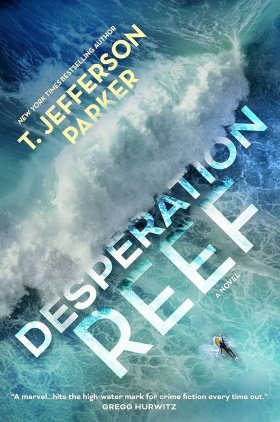“I always thought Bette Davis was scary,” he says. “Those old movies where she’s the insane bad woman.”
“My dad’s kind of woman,” says Bette. “He asked me to apologize to you for him falsely accusing you and Brock and Mahina. Do you accept?”
Casey considers this. Sees that it might well be an apology based on a convenience.
“An apology? Okay, I guess.”
“Thank goodness! You can keep this copy, as a reminder, you know. Something in writing.”
Casey leafs through it. Lots of names, companies, addresses, excerpted courtroom documents, police reports, several newspaper accounts focusing on a tong offshoot called Monterey 9. Also a Los Angeles Times story on the competitive world of fish and seafood fishermen supplying high-end Southern California restaurants. A smiling Jimmy Wu is pictured, wearing a Kings windbreaker at what appears to be a Kings game.
“I’d like to have something comparable from you, of course.”
“You mean something written?”
“Yes, just saying you don’t think we burned down the Barrel. Because, Casey—we did not.”
“I’d have to talk to Mom and Brock.”
“I’m asking you because you’re the most reasonable.”
“But they would have to agree.”
“Will you try, Casey?”
“Why do you ask for this? Are the Laguna cops closing in on you for the Barrel?”
“Do not say that! Absolutely not. They’ve been respectful. Maybe a little frustrated that there’s not one speck of evidence against us. Everything points to the Monterey 9 and Imperial Fresh Seafoods.”
Casey takes a long moment to consider. Bette’s tale of the Monterey 9 sounds possibly believable.
Laguna PD detective Pittman has asked about them, indicated that they are of interest to his investigation of the Barrel arson. He’s already sent Casey a useless photograph of an Imperial Fresh delivery van with the dancing shark on it.
Pittman has also asked Casey about the infamous Laguna arsonist Timothy Stanton Orchard, who Casey’s mom wrote an article about years ago. Shown him pictures.
But Casey hasn’t even thought about—let alone seen this weirdo—in years.
“I’ll talk to my family is all I can say. About something written.”
“Wonderful, Casey. Totally rad, as you might say.”
She pats the back of his hand lightly with hers. Which pricks his burns but also sends a zing of pleasure through him. Same as when she kissed his ear on Sunset.
“I brought something to make you respect me more,” she says.
Bette gives Mae another treat, then pulls a small trophy from the Halliburton and hands it to Casey. It’s a brass surfer girl on a wooden stand, a brass wave behind her. Nice little two-footer, Casey sees.
“I got third in the under-twelves at Huntington one year,” she says. “The waves were big, and Bethany Hamilton gave this trophy to me.”
“Sweet,” says Casey.
“You can have it to put with yours.”
“No, you should keep it.”
He sets it back in the briefcase and he sees the hurt on her face. Remembers that Bette told him she was an actor and film school graduate, too. Out here in the cool autumn sun, Bette’s face looks pale and luminescent as a pearl. And her hair black and shiny as obsidian.
“I didn’t mean to hurt your feelings,” says Casey.
“You can’t. The other reason I came is because I want to talk to you about a business arrangement. I want to help manage you.”
“Manage me?”
“Your business, your money, your happiness, your life.”
“But I’m already doing that.”
“Casey? Let me be honest and caring. You’re not doing a very good job of it.”
“In exactly what way?”
“Hear me out.”
28
She gives him a hard, matter-of-fact look. He can’t exactly hear her wheels turning, but he’s sure they are.
From the Halliburton she gives Mae another treat, then hands Casey a sheaf of papers with a fastener at the top. It looks like the purchase offer for the Barrel that the lawyer had in his briefcase, not quite hiding his gun.

























